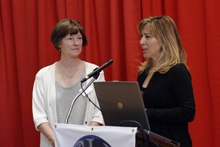Health Care as a Human Right
U.S. and Portuguese professors meet for seminar on health law and bioethics

George Annas, the Edward R. Utley Professor of Health Law, Bioethics, and Human Rights at the School of Public Health, posed a series of difficult questions about the ethics of rationing HIV/AIDS treatment to a group of international professors gathered at the School of Law last week.
“In five years, we’re going to be treating 2.5 million people infected with AIDS,” said Annas, chair of the SPH health law, bioethics, and human rights department, adding that President Bush has called for an additional $15 billion to help fight AIDS in Africa. “During that time, another at least five million people will become infected. We can’t get ahead of it unless we concentrate on prevention. These efforts are good, but it’s not going to cover everyone. So who gets treatment?”
Annas was one of 11 speakers at the second Biennial Seminar in Health Law and Bioethics: Law and Ethics in Rationing Access to Care in a High-Cost Global Economy, held on May 30 and 31. The seminar, a joint venture of the SPH department of health law, bioethics, and human rights and the Discipline of Health Law, Ethics, and Biolaw at the National School of Public Health of the New University of Lisbon in Portugal, was originally proposed by New University of Lisbon Professor Paula Lobato de Faria. The seminars are designed to create bridges between American and Portuguese institutions in the fields of health law, bioethics, and human rights.
“It’s part of our strategic plan to foster collaborative relationships that can lead to excellence,” said Wendy Mariner, an SPH professor of health law, bioethics, and human rights.
De Faria established a connection to Boston University when she came to the United States for a semester on a visiting scholarship in 2004, spending most of her time at BU.
“I wanted to study and research with the people who started health law,” said de Faria, “and this country really is the most prestigious place to study health law.”
The first seminar was held in 2005 in Lisbon and resulted in the publication of The Role of Health Law, Bioethics and Human Rights to Promote a Safer and Healthier World, a collaborative look at the issues presented at the seminar.
This year’s seminar focused specifically on issues surrounding the rationing of health care. Annas pointed out that the United States has dealt with rationing in the past. In the late 1960s, the Seattle medical community struggled to determine which renal failure patients to give preference to for the limited availability of a new treatment called dialysis. Annas said debates like these are ongoing in the study of global health and human rights.
“Unless you give everybody everything or nobody anything,” he said, “you’re rationing — even if you don’t call it rationing.”
Annas also said that society needs more than basic rules or a public process on rationing to include the human rights dimension, since the human rights dimension will be able to provide a perspective only on how a decision should not be made, rather than how it should.
“This needs to be fought out in the political arena,” he said. “Medicine can’t solve this because it is a public health problem.”
Other topics discussed by panelists included whether or not cost controls are legal and ethical, the rights of the aging, and the appropriate role of race and ethnicity in drug development and distribution.
“Ideas about issues like the distribution of AIDS drugs are a pressing public health problem at the moment,” said Mariner. “What are the appropriate ethical standards for rationing antiretroviral drugs to developing countries? We want to help inform public policy by being able to suggest criteria that can do good.”
Other seminar presenters were Michael Grodin, an SPH professor of bioethics and human rights; Jon Simon, an SPH associate professor and chair of international health; Winnie Roche, an SPH associate professor of health law, bioethics, and human rights; Leonard Glantz, an SPH professor of health law, bioethics, and human rights; Helena Pereira de Melo, an assistant professor of biolaw, New University of Lisbon Faculty of Law; Eleanor Kinney, a professor and director of the Latin American Law Program, Indiana University School of Law; Jorge Simoes, a professor of health politics, University of Aveiro, Portugal; and Paula de Oliviera Guimaraes, a jurist and Portuguese liaison officer, International Network for the Prevention of Elderly Abuse.
“This is a rich collaboration we hope we can continue,” said Mariner.
Nicole Laskowski can be reached at nicolel@bu.edu.